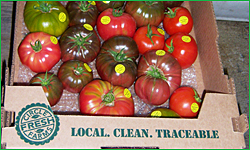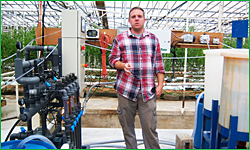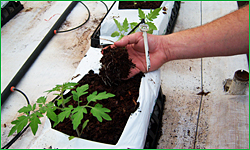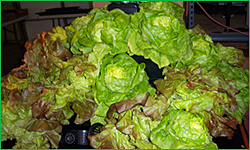- Johnny's Farm Visits & Grower Profiles
- Johnny's 2021 Grower Profiles
- Johnny's 2020 Grower Profiles
- Johnny's Tools Advisor Eliot Coleman: Celebrating Over 20 Years of Partnership | Johnny's Selected Seeds
- Late-Summer Recipe Preview with Farmer-Chef Frank Giglio | Three Lily Farm, Thorndike, Maine
- Johnny's Selected Seeds Visits Martha Stewart's Farm in the Hudson River Valley
- Javier Zamora of Javier Sanchez Medina (JSM) Organics Farms | Royal Oaks, California | Johnny's Farm Visits & Grower Profiles
- Farm Visit: 4-Town Farm, Seekonk, Massachusetts | Johnny's Selected Seeds 40th Anniversary
- Grower Profile: Selwood Green, Walton & Halifax, Nova Scotia, Canada | Johnny's Selected Seeds 40th Anniversary
- Grower Profile: Peach Crest Farm & Cooper Organics, Stratford, Oklahoma | Johnny's Selected Seeds 40th Anniversary
- Farm Visit: Paradise Farms Organics - Homestead, Florida | Johnny's Selected Seeds 40th Anniversary
- Grower Profile: Growing Power Urban Farm - Milwaukee & Madison, WI & Chicago, IL | Johnny's Selected Seeds 40th Anniversary
- Grower Profile: Slegers Greenhouses - Strathroy, Ontario, Canada | Johnny's Selected Seeds 40th Anniversary
- Grower Profile: Gathering Together Farm - Philomath, Oregon | Johnny's Selected Seeds 40th Anniversary
- Grower Profile: Pleasant Valley Farm - Argyle, New York | Johnny's Selected Seeds 40th Anniversary
- Farm Visit: Mark's Melon Patch – Dawson, Georgia | Johnny's Selected Seeds 40th Anniversary
- Grower Profile: Louie's Pumpkin Patch - Skövde, Sweden | Johnny's Selected Seeds 40th Anniversary
- Grower Profile: Living Water Farms - Strawn, Illinois | Johnny's Selected Seeds 40th Anniversary
- Farm Visit: Circle Fresh Farms - Denver, Colorado | Johnny's Selected Seeds 40th Anniversary
- Grower Profile: Freedom Farm - Freedom, Maine | Johnny's Selected Seeds 40th Anniversary
Circle Fresh Farms • Denver, Colorado
40th Anniversary Farm Visit — February 2013
Selling produce to large buyers such as supermarket chains can be tough for small, local growers who lack sufficient quantity and have a limited season of availability for any given item.
Circle Fresh Farms, a grower consortium based in Denver, Colorado has surmounted both obstacles with an innovative marketing arrangement in which 10 farms work together to provide sufficient quantity and year-round availability of tomatoes, cucumbers, and lettuce. Even more unusual is the growing system used by all 10 farms: certified-organic, hydroponic greenhouse production.
Circle Fresh Farms was started in 2011 with two farms and about 12,000 square feet of greenhouse operations. Just two years later, it has more than 200,000 square feet of greenhouse production. Thanks to its success in the Denver metro area, Circle Fresh Farms is thinking about taking its model to at least two other cities later this year and expanding from there.
The Marketing Network
Circle Fresh Farms was inspired by an early version of the network farming model created by Tyson Chicken, in which a central company provided marketing and technical assistance for a network of independently owned farms. The founders of Circle Fresh Farms, John Nicholas, Rich Naha, and Zach Frisch, devised successful hydroponic production systems that they could teach to other growers, with the agreement that the growers would sell all their production to Circle Fresh. In turn, Circle Fresh would be able to supply large buyers, primarily Whole Foods Markets. Ninety percent of Circle Fresh Farms' production goes to the Whole Foods Denver Distribution Center, where it is taken to the stores in the Front Range area. Some goes to wholesale distributors and a small percentage is sold at farmers' markets.
Ryan Kinnison, the production manager for Circle Fresh Farms, explains how the system works: "When you sign our Network Growers Agreement, we provide technical assistance and conduct the organic certification and food safety certification at your operation. That takes a lot of anxiety away from growers, so they can concentrate on growing and, as we like to say, getting the produce in the box. We offer dual branding, with both the farm's name and Circle Fresh Farms logo. Our agreement with farmers is that once their produce is delivered to Whole Foods, you get paid net 30 — which really helps the small guy's cash flow.
"Circle Fresh Farms takes a percentage of gross and you get access to production and marketing assistance. We ask for a 3–5-year agreement because we put a lot of time and money into training you."
Circle Fresh Farms visits every farm each week to offer technical assistance and gather information that will help the company forecast the harvest in upcoming weeks. As another example of shared resources, Circle Fresh Farms last year created a track-and-trace program that the stores are requiring and that may soon be required by federal law for larger growers. Every box of produce from every network farm now has a QR code that produce managers can scan to find out where it was grown, when it was packed, and other details that would enable products to be recalled in the event of a food safety problem. Circle Fresh also takes care of all the paperwork for members' organic certification.
Organic Hydroponics
Although hydroponic vegetable production is well-established, the science of Certified Organic hydroponics is still in its infancy. Organic nutrient solutions have only recently become available commercially, and some of the blends in the Circle Fresh greenhouses are proprietary mixes. Ryan says the system is still being tweaked, and that tissue tests are taken every week to ensure the plants are getting what they need. The farms are all certified by CCOF, a California agency that has more than 1 million acres certified nationwide.
Circle Fresh decided early on to grow hydroponically because of the possibility of producing year-round in climate-controlled greenhouses. Some growers produce a few different crops at their facilities.
"Tomatoes have a higher return per square foot than lettuce or cucumbers, but you will have more risk," Ryan said. "If you lose a lettuce crop, you're down for only 40 days. But with a tomato crop, it will be 100 days before you can get back in."
Typical crop cycles from seeding to final harvest and removing the plants are 9 months for tomatoes, 5 months for cucumbers, and 40 days for most lettuces. Crop cycles are slightly offset for each farm so that network-wide, "We're able to keep our foot in the door all year," Ryan said.
Tomatoes that are seeded February 1st are transplanted into coconut coir on March 1st. Growers use 4'-long by 8"-wide by 6"-thick slabs of compressed coir because they are easy to lay out and hydrate with beneficial mycorrhizae and nutrients. Four plants are planted into each slab. The first harvest is around May 15th, and the goal is to keep those plants producing right up through the end of the year. The vines are removed in early January, and the greenhouse is then sanitized and prepared for the next crop.
Circle Fresh sources a majority of its seeds from Johnny's. For tomatoes, they grow a tomato-on-the-vine, a beefsteak, and a Roma type. For cucumbers, they grow the smooth-skin mini cucumber 'Rocky,' which is packed in 1-pound boxes, and 'Excelsior,' a pickling cucumber. For head lettuce, they grow the green butterhead 'Rex' and the red butterhead 'Skyphos.' They are currently gearing up to produce the 'Salanova' lettuce line, which can be grown as a head then cut into uniform leaves for salad mix.
Circle Fresh recently developed a "Living Lettuce" display for Whole Foods, in which the lettuce heads are placed, roots intact, into a pyramid-shaped tray with circulating tap water. The display attracts a lot of attention and preserves the freshness of the lettuce; at the same time, it saves the growers 25 cents a head for the clamshell box that living lettuce is normally packed in.
Expansion Plans
Ryan says the price per pound premium that organic produce gets is essential to profitability, due to increased costs in organic production and winter heating bills. But so far the higher prices have not been a problem for Denver shoppers.
"If you're local and you're organic, that is the ultimate bar of achievement," Ryan said. "We've seen trends suggesting that even 'local and conventional' carries a lot of weight in the marketplace."
Circle Fresh Farms hopes to start new grower networks in Kansas City and somewhere in Nevada this year. "Our goal is not to become a mega farm and be shipping produce two to three states away," Ryan said. "Instead of building 20 acres of greenhouse here and shipping to Kansas City (600 miles away), we want to build a greenhouse in Kansas City and recruit 20 local growers."
- To learn more, visit the Circle Fresh Farms website.
- Images reproduced with permission from Circle Fresh Farm. All rights reserved.
- Browse all Johnny's 40th Anniversary Farm Visits & Grower Profiles.






